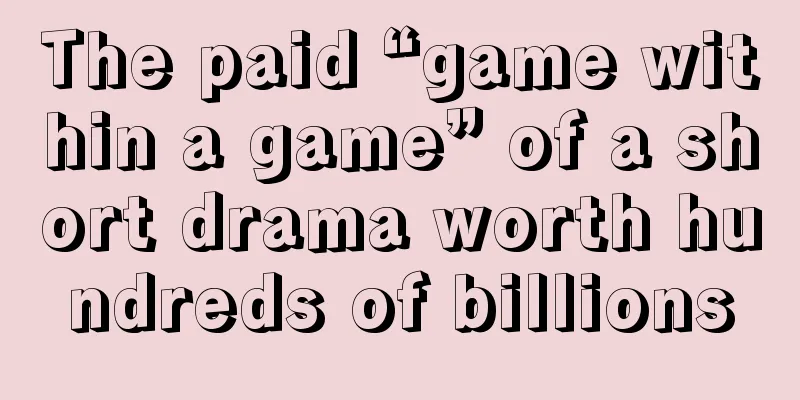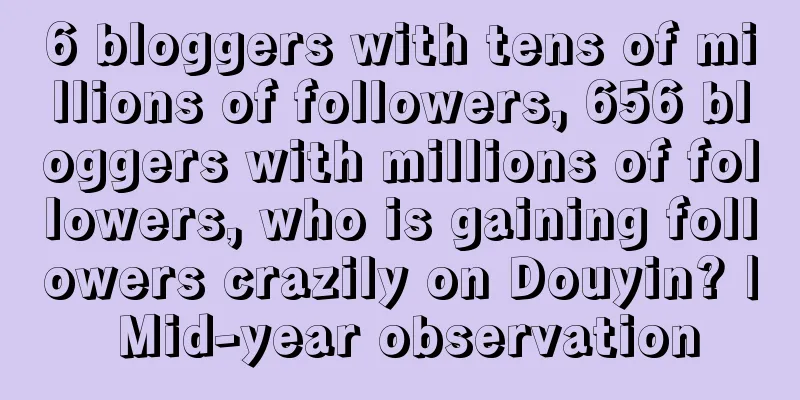The paid “game within a game” of a short drama worth hundreds of billions

Recently, the China Internet Audiovisual Association issued a notice that the short drama "Teacher, Don't Run" and its mini-program platform where it was broadcast were removed from the entire network because of its vulgar plot and serious soft pornography in its lines, pictures and plots. Ever since the short drama (also known as mini-program drama, which refers to a micro-short drama with a single episode length of one to two minutes) became a hit last year, the controversy behind it has never stopped. On the one hand, it represents a hot market. "Hot short drama earns 100 million yuan a day", "Breaking 800 million during the Spring Festival", "A couple earns more than 400 million yuan a month by making short dramas" and other hot searches continue. It is even estimated that the market size will reach 100 billion yuan in 2027. But on the other hand, it is plagued by problems. The content is accused of being melodramatic, pornographic, and brainless, and the fees are misleading. Many elderly people have spent thousands of yuan watching short dramas without knowing it, which has aroused strong dissatisfaction among netizens. On the Black Cat complaint platform, there are nearly 800 complaints about the fees for short dramas. "Dingjiao" once focused on the production process of short dramas in the article "Mass Copy of Popular Short Dramas", pointing out that there are routines in the subject matter, plot, and lines. As the upstream and downstream industry chains gradually surfaced and more and more industry problems were exposed, "Dingjiao" once again talked with practitioners in different links such as short drama producers, platform owners, directors, and editors. In fact, from users swiping short drama clips on short video platforms, jumping to short drama mini-programs, downloading APPs to watch for free, and then paying to unlock the remaining episodes, each link has been carefully designed. What is even more surprising is that some practitioners said that not only users but also themselves have fallen into the trap of skits. 1. The editor takes action, the pitcher assists, and the high-energy short video attracts youMany people get into short dramas by watching short videos. Cai Cai just happened to see a short video with high-energy content and constant twists and turns. Driven by curiosity, she began to search for the mini program platform mentioned in the short video and started to follow the drama. The short videos that Cai Cai saw can be understood as "advertisements" for short dramas. Industry insiders call it traffic investment, which is the first step in guiding users to pay. A senior screenwriter told Dingjiao that many popular short dramas on the market have almost the same beginning, turning point, and ending, and even the male and female protagonists are copied and pasted. Since this template has been tried and tested, many producers and platforms just copy it to save trouble. The streaming materials, that is, the videos that are put on major social media, are crucial and there is also a set of mature templates, which mainly tests the "skills" of the editor. Many editors know as much about short plays as their screenwriters. Some companies have dedicated editing masters and apprentices to work with them, and they also provide regular training on film editing. Editor Nan Nan told "Dingjiao" that the industry generally recognizes that there are three main points in short drama editing: "Slap the other person in the face", which refers to the exciting plot in the film; "I'll give 10 billion", which refers to the more eye-catching clips of showing off wealth; and "Why is it you?", which refers to some shocking and suspenseful stories. The better editors can capture the users within a few seconds. Wanzi, a senior practitioner of short dramas, said that on the one hand, they can edit out the special features of the drama among similar contents, and on the other hand, they also understand the user psychology very well. Wanzi thinks that the streaming material of the hit short drama "I was a Stepmother in the 1980s" is a good example. "The heroine originally thought that the hero she was forced to marry was a greasy old man, but when she woke up, she found that the hero was actually very handsome, and she became a tall, rich and handsome woman. This video not only has a reversal, but also allows some users to start 'self-fantasy'." In Wanzi's impression, there are many streaming videos of the show that are very eye-catching. There are various quarrel scenes in the short drama to exaggerate the emotions. Many editors will cut out these contents, thinking that they are more exciting. But Wanzi believes that simply quarreling between characters is not eye-catching enough. A more advanced method is to "choose quarrel scenes when the identities of the characters in the drama resonate with the users, such as a quarrel between the mother-in-law and the daughter-in-law, and the heroine has to suppress the mother-in-law, which releases the anger of women who are oppressed in family life today." She concluded that generally, the more effective material for male-oriented stories (mainly male audience) is that the male protagonist becomes rich from poor and madly suppresses others, while the more effective material for female-oriented stories (mainly female audience) is that the female protagonist has a boy to help her regardless of whether she has the ability or not. The principle behind both is the same, and they fulfill the "daydreams" of ordinary men and women. In addition to having conflicting and reversing content rhythms and understanding user psychology, editors must also learn to take advantage of hot topics. For example, editing with the help of popular long dramas, movies, or popular online memes can often achieve twice the result with half the effort. On the one hand, the platform will increase recommendations, and on the other hand, users also like it. A short drama user said that he was originally browsing a long drama clip on the social platform, and accidentally saw the related short drama content, so he watched it. After the editor finishes cutting the drainage video, it’s the pitcher’s turn. A short drama usually has a streaming test period, during which the creators will release the material in batches. They will first send hundreds or thousands of videos to major social media platforms to observe the ROI (return on investment). If the effect is not good, they will immediately adjust a new set of materials or simply abandon the drama. The platform will label users based on the content they browse, and pitchers will also set target users based on the subject matter, segmented by gender, age, and region. Generally speaking, users over 40 years old in third- and fourth-tier cities are more likely to be attracted to pay, and are also the focus of investment. Pitchers will also take advantage of some platform rules, such as 10 a.m., after 2 p.m., and 5 to 7 p.m., which are usually the time periods when the platform has the most online users and the highest number of recommendations, and the middle-aged and elderly people usually get up at 6 or 7 a.m. to watch short videos. Pitchers will focus on these times. At the same time, they will choose the time period for streaming according to different themes. For example, for folklore, it is better to choose the evening. This is also the reason why many users in first-tier cities cannot see such short drama ads, but their parents can, and some users cannot see them during the day but can see them at night. In the final analysis, it is because the pitchers have not yet targeted you. 2. Pricing for short plays: no standard, prices may increase at any timeWhen users are attracted by streaming videos and jump to related mini-programs or apps to watch, they are one step closer to paying. The profit model of short dramas mainly relies on user payment. The first few episodes are free, and the first payment point is usually around episode 10. Therefore, the screenwriter will pay great attention to the content of the first 10 episodes, and then leave enough hooks at episodes 9-10 to arouse the user's willingness to pay, and there will be payment points for episodes 20 and 30 later. There are two modes of paying for short dramas, which many practitioners call two routines. One is to charge virtual currency, and the other is to charge money directly. The former are mostly on the mini-program side, and the latter are APPs. An industry insider told "Dingjiao" that many platforms have also played math games because of this. On the mini program side, most platforms follow a segmented recharge model. For example, there are several levels of 39 yuan, 59 yuan, 69 yuan, 99 yuan, and 199 yuan. 39 yuan corresponds to 3,900 gold beans/coins, 59 yuan is 5,900 gold beans/coins, and so on. As the amount increases, the platform will give more gold beans. The higher the value of the recharged currency, the more gold beans will be given. It takes about 200 gold beans to unlock one episode, and a short drama has about 100 episodes. The insider said that the reason why the calculation is not based on the number of gold beans per episode is that many consumers cannot figure out the calculation, especially for some elderly people who are not familiar with the Internet, it is even more difficult to calculate. In this process, there is also the phenomenon of misleading recharge. Many netizens have publicly revealed that after their parents watched the drama on the mini program, a 9.9 gold bean/coin payment link popped up. They thought they could watch the whole series after recharging, but after unlocking a few episodes, the recharge link popped up again. Another consumer said that the elderly in his family usually accumulated some virtual currency when watching other short videos and advertisements, which made him mistakenly think that he was spending these coins when watching paid short dramas, so he clicked the button to agree to pay. As long as he swiped, the platform would automatically deduct the fee, and he ended up spending hundreds of dollars. The platform will also indicate that virtual goods cannot be returned or exchanged. The APP is relatively straightforward and will indicate how much it costs to unlock an episode, but there are many tricks involved. If you are not careful, users will spend hundreds of yuan. There are roughly three payment methods. The first is to unlock a single episode, which is priced at about 1 yuan per episode; the second is to buy the entire series at a low price, which costs 9.9 yuan, 19 yuan, or 38 yuan. However, some platforms will require users to open a membership to watch after spending 9.9 yuan, and there is a hidden option that automatically activates renewal for the next episode by default; there is also a high-priced purchase of the entire series, which is basically priced at more than 100 yuan. In comparison, the form of purchasing the entire set at a low price has the most hidden mysteries. A platform owner explained that "9.9 yuan to watch the entire series" is generally a test of the platform's content for the short series, mainly to quickly understand the user profile of the series. The platform first uses low prices to induce users to watch and pay. Once the series has run for three or five hours and the number of users has increased, they will cancel the 9.9 yuan and raise the price. "He gave an example, there is also a phenomenon that some dramas have been online for only one hour, and because they are popular, the platform immediately cancels the low price. In addition, the backend programmers of the short drama platform will keep an eye on the user's viewing and recharge data, and some platforms will even adjust the price of each drama in real time. This means that users who come in at different times may pay different prices. There are also many free short dramas in these apps. A senior producer told "Dingjiao" that most of these short dramas are second-run short dramas, which are given to users by the platform as promotional benefits, and are considered a means to attract users to subscribe. However, a person from the platform told "Dingjiao" that the user stickiness of short drama platforms is not high. Most users saw an advertisement for a drama and then found this platform to watch it. They don’t remember the name of the platform after watching it. Therefore, there are very few people who subscribe to membership like long video platforms. Most of them buy single episodes or all episodes. Therefore, their platform will also give more thought to these two modes. 3. "Invest 350,000 yuan and get 284 yuan", practitioners can't escape the routineAccording to media statistics, the market size of short dramas will reach 37.39 billion yuan in 2023, close to 70% of the film market, and is expected to reach 100 billion yuan in 2027. From time to time, the market also exposes the explosive figures of "8-day recharge amount exceeds 100 million" and "24-hour recharge amount exceeds 12 million". However, recently, the voice of "making money by doing short dramas" is no longer the mainstream of the market. Many short drama production companies and directors have publicly stated that in the past year, they have made more than a dozen or even dozens of short dramas and have not made any money. Some have even lost millions. Producer and director Mr. Yang started making short plays in 2022 and was one of the first to enter the market. This year, they plan to give up this business because it is not profitable. Many people around him have left one after another. He lamented that short plays are full of routines, and even people who make short plays will fall into the trap if they are not careful. "Focus" also asked several short play producers. In the second half of last year, they were still enthusiastic about this market, but now the response is, "No more, we can't win." So, who is actually making money behind the high figures that are exposed from time to time and the market size of hundreds of billions? Based on the analysis of different links and multiple practitioners, the more consistent view is that the bulk of the money in this market may currently be in the hands of short drama platforms. There are generally two ways for producers to make money by making short dramas. One is to contract the production for a short drama platform. The platform provides the script, the copyright belongs to the platform, and the producer is responsible for filming. Although they also participate in the profit sharing later (the platform's income is distributed according to a certain ratio), the bulk of the money is the cost of the contract. The other is to invest fully, the platform provides the script, the copyright still belongs to the platform, and the main profit is the profit sharing. It should be noted that short dramas attach great importance to traffic investment, which is a huge expense, usually borne by the short drama platform. Previously, a short drama practitioner told "Dingjiao" that a short drama with an income of 10 million yuan would spend about 8 million yuan on traffic investment. Many people only see that the daily turnover of short drama promotions has exceeded 10 million or 100 million yuan, but ignore the cost of traffic investment. Mr. Ji made short plays for the platform, and later he built his own platform. He told Dingjiao that this business is only safe if both the content and the platform are in his own hands. Before building his own platform, Mr. Ji invested several million yuan to shoot and produce 11 short dramas, but only recovered less than one-third of the cost. The worst one was an investment of 350,000 yuan, but the final distribution was 284 yuan. The platform explained that the investment was not enough and no one watched it. Mr. Yang also had a similar experience. His own drama was on the platform's popularity list, but he still didn't get any money. Another director revealed that a drama he made was a hit based on the popularity data, but the profit was negative 2,000 yuan. In the end, he didn't get a penny from the drama and made a complete loss. "Dingjiao" asked relevant personnel from several platforms about the phenomenon of negative profit orders. The explanation given by them was that there were problems with the shooting quality of some dramas, and although some dramas were of good quality, users might not necessarily pay for them. It is normal for some people to make money and some to lose money in this industry, and this phenomenon has always existed. It is understood that due to various factors such as the subject matter, short dramas do have the phenomenon of high streaming video playback and low conversion. However, more than one industry insider feels that even so, it should not be the case that a large number of people cannot make money because of this. They suspect that there is something wrong with the data, which is also the biggest problem facing the short drama market - data opacity. Regarding revenue, some platforms will give partners an account and password. Producers can see their revenue after logging in, but there is no detailed data such as the number of viewers and the ratio of male and female users. And due to the lack of third-party supervision, data such as investment conversion and user recharge will not be disclosed by the short drama platform. This also makes the authenticity of the data questionable. Many producers also suspect that some platforms engage in volume-seeking behavior, that is, the actual traffic data is far lower than what they tell the producers. Mr. Ji gave an explanation from a technical perspective. Unlike long video platforms such as iQiyi, Youku and Tencent Video, some short drama platforms are not standardized and have relatively small content scale, so it is very easy to modify the data. An industry insider revealed that if the producer wants to see the traffic data, the platform will face multiple traffic channels and may check the one with the lowest conversion rate and not display the others. Mr. Ji also found out through some internal channels that the drama that caused him huge losses was because the traffic was far lower than the amount said by the platform. Later, he put the drama on his own platform to verify it. As a result, the second round of comprehensive monetization income was dozens of times higher than what it was at the time. In addition, directors and screenwriters do not have the right to sign their works, their works are often claimed by others, and problems such as "yin-yang contracts" have also been exposed. Mr. Yang showed Dingjiao a production contract signed with the platform, which was a separate contract for actors and staff that the other party required to be signed. "Obviously, these were our own people from the production side, but they turned out to be people hired by the platform." He felt that the platform wanted to inflate costs, and the ultimate goal was most likely to evade taxes. Some skit practitioners are worried that this seemingly lively market is about to burst as more and more routines are revealed. It is also questionable how long the audience's enthusiasm can last. Author: Wang Lu WeChat public account: Dingjiao (ID: dingjiaoone) |
<<: How do freelancers price themselves?
>>: The growth logic of the cultural tourism industry has changed
Recommend
How to quickly layout and detonate the video account, this is the best answer
In this digital age, video accounts, as an emergin...
Bulgari vs. Moutai, Zongzi also plays the contempt chain
Many people feel pressured to eat Zongzi during th...
ChatGPT+Xiaohongshu e-commerce sales, earning 2000+ per day Methodology 2.0
This article shares a very popular new gameplay, w...
When is Amazon Carnival? What are the activities of Amazon Carnival?
As one of the world's largest e-commerce platf...
What kind of brand collaboration is a marketing bomb?
What kind of brand collaboration can ignite market...
Build a personal brand IP profit model
Previously, we shared how to build a personal bran...
In addition to low prices, what else does Meituan’s God Membership need to provide to users?
Recently, Meituan officially upgraded and revised ...
10 Marketing Trends for 2025
As 2024 draws to a close, we stand on the threshol...
Help, are copywriters going to lose their jobs to poets?
Nowadays, copywriting is becoming more and more di...
Can the deleted Amazon parent body be restored? How to restore it?
When it comes to the content of Amazon parent body...
The "Creator Profit Plan" of Video Account has been officially launched. Is this the opportunity for creators?
Introduction: As a rising star in the short video ...
What should I pay attention to when using Amazon Japan? How can I open an Amazon Japan site?
As one of the world's largest e-commerce platf...
How to improve the conversion rate of e-commerce links - transaction points
How to improve the conversion rate of e-commerce l...
Recommended collection: 7 Xiaohongshu tool models summarized by myself are open to the public
The author of this article summarizes seven Xiaoho...
How to participate in Shopee promotions? What are the common questions?
There are many ways to operate a Shopee store. Som...









